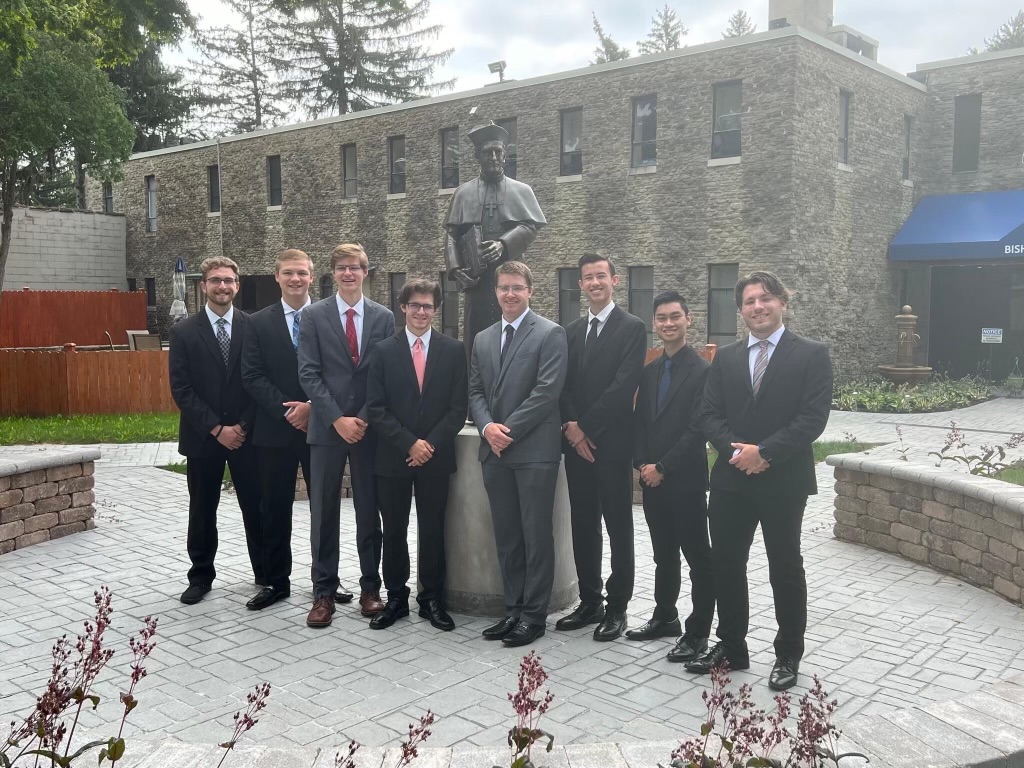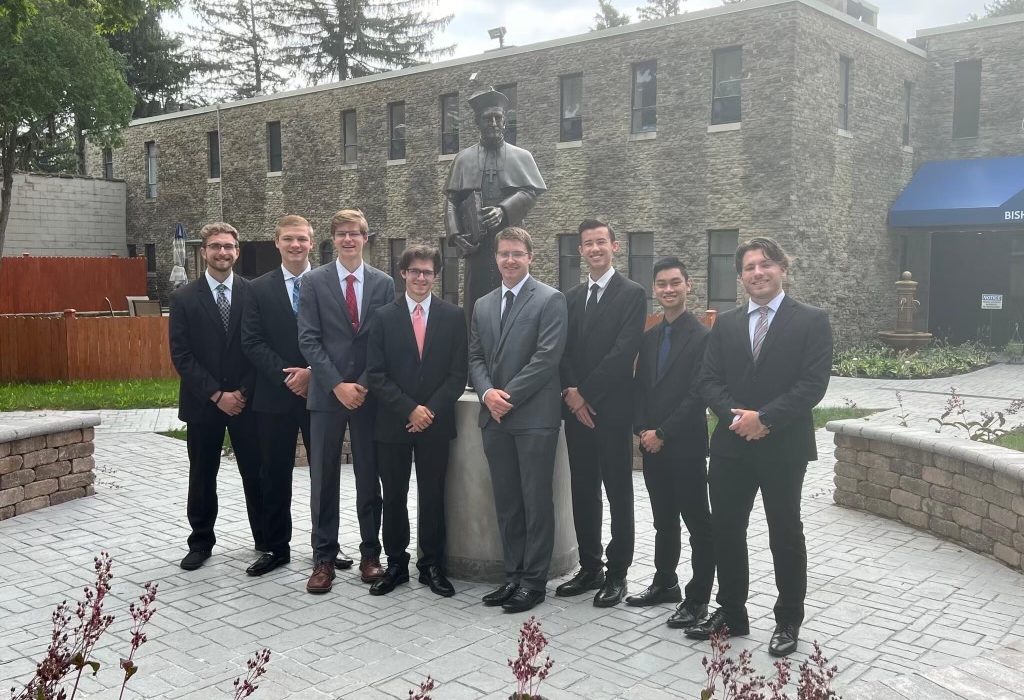February 6, 2024 // Diocese
Diocesan Seminarians Reflect on First Semester of New Program of Priestly Formation
You don’t have to ask seminarian Paul Cline twice about the highlight of his first year of religious formation.
“We have Mass every day, and life revolves around Jesus and receiving Him,” Cline told Today’s Catholic. “First and foremost, it’s the thing you do, and I think that’s amazing.”
Such is life at Bishop Simon Bruté College Seminary in Indianapolis, where two first-year seminarians from the Diocese of Fort Wayne-South Bend are among the first to experience the Church’s new model for shaping future priests. Paul Cline and Thomas Bundy have just begun the second semester of their Propaedeutic year – one of the most significant recent changes to priestly formation, according to Father Jonathan Norton, Diocesan Director of Seminarians.
“The Church saw a need to have a more focused time at the beginning on the spiritual and human formation of seminarians,” said Father Norton, who also serves as Pastor of Sacred Heart Church in Warsaw. “During this first year – Propaedeutic means ‘introductory stage’ – there are 12 months of formation, separate from the rest of the seminary. It comes with its own program and its own hours of prayer to focus more on the guys’ spiritual and human formation. They get to know themselves, accept their weaknesses, learn to be humble in their strengths, and develop a good prayer life.”
The sixth edition of the Program of Priestly Formation, which was drafted by the U.S. Conference of Catholic Bishops and approved by the Vatican in 2022, has reshaped the education and formation of seminarians across the country. Under the new model, priestly formation is now divided into four stages: the Propaedeutic Stage, in which seminarians spend one year building a foundation of human and spiritual formation; the Discipleship Stage, in which seminarians study philosophy and grow as faithful disciples of Jesus; the Configuration Stage, in which seminarians study theology and configure themselves to Christ as shepherds and spiritual fathers; and the Vocational Synthesis Stage, in which seminarians are ordained as deacons in their home diocese and are placed in a parish for six months to help transition into the priesthood.
“It’s hard,” Father Norton said of transitioning to parish life, as he reflected on his own journey from Mount St. Mary’s Seminary in Emmitsburg, Maryland, to his first priestly assignment at St. Vincent de Paul in Fort Wayne. “You go from living with 150 men in community and prayer and sharing meals, to St. Vincent with two other priests, and you’re thrown into ministry – it’s quite an adjustment. We’ve worked with having a mentor system in the diocese, and that has borne some fruit, but this is a very intentional way that the Church is approaching it.”
Although the major seminaries that currently house our diocesan seminarians – including Mount St. Mary’s, Saint Meinrad in southern Indiana, and the Pontifical North American College in Rome – offer all four stages of formation, they are designed for young men discerning the priesthood who have already received college degrees. Those entering the seminary without a degree are required to first attend college seminary. Enter Simon Bruté, which Bishop Rhoades handpicked as the college seminary choice for such seminarians from the Diocese of Fort Wayne-South Bend. The building, which was originally built for the Carmelite Sisters of Indianapolis in 1932, is known for its medieval architecture, including turrets and arched doorways.
“It’s a really cool place; it’s pretty much a castle,” Cline said with a laugh. “I get to live in a castle, and it’s really awesome.”
While seminarians already part of the Church’s prior model are essentially “grandfathered in” and will finish their formation as planned, new seminarians began their Propaedeutic year this past fall. That meant Bundy and Cline were among the first to attend the program at Simon Bruté, which Bundy said has had both its benefits and drawbacks. For example, the intentionally lighter workload in the classroom during the Propaedeutic year has presented him with ample free time, which can be a double-edged sword.
“That free time has really freed me up to find a structure of prayer in my life,” said Bundy, whose home parish is Our Lady of Good Hope in Fort Wayne. “With that lower class load, it’s easy to find yourself in lulls, so you have to find out how to navigate through the free time. Finding structure has also really helped me to make the transition from high school to college.”
In addition to being “guinea pigs,” members of this year’s Propaedeutic class – affectionally referred to as “Propadudes” by the other seminarian classes – have their own Masses and formation nights. However, Cline and Bundy have quickly gotten to know their classmates, thanks to the smaller class sizes. In fact, they have particularly bonded with the handful of other seminarians hailing from outside the Archdiocese of Indianapolis.
Though classmates now, Cline and Bundy took vastly different paths to Simon Bruté and to religious formation. After graduating from high school, Cline spent time searching for direction as he discerned between college and trade school. He ultimately decided to listen to the Lord’s prompting and was the final seminarian accepted by former Diocesan Vocations Director Father Andrew Budzinski. Although he said he didn’t know anyone when he came to Simon Bruté, he’s been able to connect with his younger sister, who is studying nursing at nearby Marian University. Cline admitted it was “a little weird” at first being simultaneously a first-year seminarian and one of the oldest in the seminary, but he said he’s just trying to follow God’s will for his life.
“I want to do what God wants me to do – or at least, I want to want to do what God wants me to do,” explained Cline, whose home parish is St. Matthew Cathedral in South Bend. “I felt like I was being called to go to the seminary, to discern the priesthood, and God led me here for a reason. If, in three years, He is calling me to do something else, I will do that. Taking that extra step and going through formation has been really good. I think it’s a step that more people should take in terms of discerning. Time in the seminary helps you desire God’s will in that way.”

Seminarians Paul Cline, far left, and Thomas Bundy, third from right, pose with other members of the Propaedeutic class at Bishop Simon Bruté College Seminary in Indianapolis.
Meanwhile, Bundy – who called himself a “lifer” and applied for the seminary straight out of high school – began to hear the call to the priesthood as early as second grade, when he received his first Communion.
“I remember receiving the Lord in the Eucharist,” Bundy recalled. “A thought occurred in my head out of nowhere: the Lord was pressing on my heart, saying, ‘Thomas, I want you to be a priest.’” The Lord continued to press this thought on his mind through the years as he witnessed the faith being lived out by his parents and priests, particularly Father Daniel Whelan. “My vocation is always something I prayed about, and whenever I did, I continued to get that affirmation: ‘Priesthood is the path.’ That draw has never really gone away.”
It finally culminated during a high school retreat at St. Charles Borromeo in Fort Wayne. “I was lying prostrate before the Blessed Sacrament, and an image came into my head of me looking down on hands that were bearing the stigmata,” Bundy said. “A couple days after, as I was kneeling in Mass during the elevation as the priest held the Eucharist, I knew that priest was bearing the marks of Christ. I made the connection that those hands bearing the stigmata were my hands. The Lord was calling me to bear the marks of Christ, to be His priest.”
As Bundy and Cline journey through their Propaedeutic and Discipleship Stages – both of which they will complete at Simon Bruté before transferring to a major seminary for the Configuration Stage – they continue to grow in relationship with each other, as they have done since meeting at orientation last July. “We’ve gotten a lot closer,” Cline said. “Building that relationship with Thomas has been really good.”
The best news. Delivered to your inbox.
Subscribe to our mailing list today.






